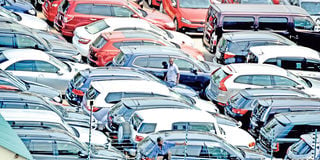Premium
Confusion mars diaspora initiative to import personal cars duty free

Imported second-hand vehicles in a yard in Mombasa on January 15, 2019.
What you need to know:
- In August 2014, just a year after taking power, President Uhuru Kenyatta said Kenyans returning from overseas with left-hand-drive vehicles would be allowed to bring in right-hand-drive models duty-free.
- According to the Kenya Standard Code of Practice for Inspection of Road Vehicles administered by the Kenya Bureau of Standards, (Kebs), vehicles destined for Kenya should be less than eight years old from the year of first registration.
- Several Kenyans who claimed the directive had not been acted on allege that Treasury officials and Kenya Revenue Authority, (KRA) have denied knowledge of the initiative and were barring returnees from bringing in cars into the country under the programme.
A presidential directive easing importation of cars by the diaspora is being implemented, the National Treasury has said.
But a section of Kenyans living in the US, who have sought to take advantage of the duty waiver, claim that the directive had been ignored.
In August 2014, just a year after taking power, President Uhuru Kenyatta said Kenyans returning from overseas with left-hand-drive vehicles would be allowed to bring in right-hand-drive models duty-free.
According to the Kenya Standard Code of Practice for Inspection of Road Vehicles administered by the Kenya Bureau of Standards, (Kebs), vehicles destined for Kenya should be less than eight years old from the year of first registration.
Also, the difference between the year of manufacture and the year of first registration should not be more than one year.
They should also be right-hand drive models and road worthy.
DUTY SCRAPPED
The President, while making his maiden trip to the United States, told the ministries of Transport, Finance and Trade to scrap duty for citizens who would sell vehicles with the steering wheel on the left side and buy those with the steering wheel on the right to comply with Kenya’s transport rules.
Several Kenyans who claimed the directive had not been acted on allege that Treasury officials and Kenya Revenue Authority, (KRA) have denied knowledge of the initiative and were barring returnees from bringing in cars into the country under the programme.
Mr Eston Ndekere, who claimed to be affected, said last week: “During his last visit to the US, President Kenyatta said he would direct the Central Bank to enable Kenyans in the diaspora to invest at an interest of six per cent and negotiate a concessionary money transfer rate.
He also promised a tax waiver on cars being shipped home. Since then, talk of this has gone quiet and Treasury and Kenya Revenue Authority officials have denied any such arrangement.”
TREASURY DENIAL
Contacted, the Treasury refuted these claims, terming them “untrue.” On the car import duty waiver for Kenyan returnees from the US, Treasury Cabinet Secretary Henry Rotich said they had in fact processed “many” such requests.
But he insisted that the process had been made both transparent and fool proof to weed out fake returnees.
“We have processed many requests. The programme is being implemented effectively without hitches. Anyone who has encountered challenges should raise the issue with me personally through the Treasury,” said Mr Rotich.
He added: “But one must show genuine documentation that they are coming back to settle in Kenya and that they are not just coming for a temporary visit.
You must also show that you have sold your old car, besides the new car being of a similar make,” the CS said.
In relaxing the rules to allow Kenyans abroad to sell their left-hand-drive cars and import right-hand ones duty-free when they return home, President Kenyatta said the diaspora had been discriminated by the earlier policy.
LEFT-HAND-DRIVE VEHICLES
Kenya is among 76 countries and territories that drive on the left. Scrapping import duty and exercise duty was deemed a big relief for car-owning Kenyans.
More than 160 countries drive on the right. They include the US and Russia.
The Kenya Bureau of Statistics, (Kebs) has for long stood its ground on restriction of left-hand-drive vehicles, noting that according to its research such cars increased the likelihood of accidents on the roads.
The price of imported second-hand cars went up from December last year as the new Excise Duty Act took effect.
Second-hand cars that are less than three years old from the date of first registration now attract a duty of Sh150,000 a unit, while those more than three years old attract an excise duty of Sh200,000 a unit.
Mr Rotich at the time defended the rise in excise taxes on cars, saying it would promote the health of motorists and boost environmental protection.





